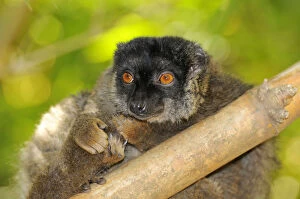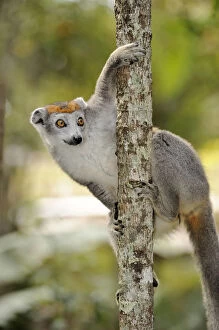Macaco Collection
"Macaco: The Endangered Monkeys of Madagascar and Brazil" In the lush rainforests of Madagascar
All Professionally Made to Order for Quick Shipping
"Macaco: The Endangered Monkeys of Madagascar and Brazil" In the lush rainforests of Madagascar, a captivating creature known as the Black ruffed lemur (Varecia variegata) roams. With its striking black fur and piercing yellow eyes, this critically endangered macaco species is a sight to behold. Sadly, their population is dwindling due to habitat loss and illegal hunting. Meanwhile, across the globe in Brazil, another type takes center stage - the Macaco Prego monkey (Cebus apella). These wide-ranging South American primates are highly adaptable and can be found in various habitats from dense forests to urban areas like Sao Vicente. Their playful nature and intelligence make them beloved by locals. Not far away in Madagascar's diverse ecosystem resides the Black-and-white ruffed lemur (Varecia variegata), showcasing its stunning contrasted coat. This charismatic primate captivates with its acrobatic skills as it swings through trees with grace. The Common Brown Lemur (Eulemur fulvus fulvus) adds a touch of charm to Madagascar's landscape. Whether sitting on branches or posing for portraits, these lemurs enchant observers with their expressive faces and gentle demeanor. Venturing deeper into the Madagascan wilderness reveals yet another fascinating member of the macaco family - the Crowned Lemur (Eulemur coronatus). Hanging effortlessly from branches, females display their regal crowns while observing their surroundings with curiosity. Lastly, we encounter an elusive beauty - the Black Lemur (Eulemur macaco). Found exclusively in Madagascar's forests, this rare primate showcases glossy black fur that shimmers under sunlight. Its presence reminds us of nature's wonders that deserve our protection. As we admire these incredible creatures through pictures captured by talented photographers (#10750573 #10750575 #10750569), let us remember the importance of conservation efforts.










